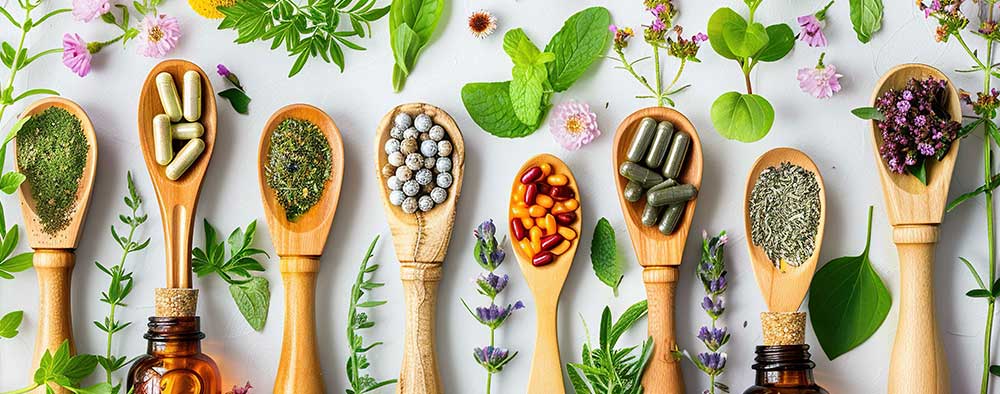The Buzz on Natural Remedies: From Coughs to COPD Relief
As soon as I open any of my social media feeds, it’s like stepping into a virtual three-ring circus of health and wellness—strength training advice somersaulting next to herbal apothecary recipes tightrope walking across my screen. While it’s great to see so much interest in health, trying to sift through all the advice feels like searching for the last fried green tomato at a church potluck. 🤯 One topic that’s always intrigued me is natural herbal remedies for ailments, such as honey for coughs and elderberry for immunity—things our grandparents probably knew better than the back of their own hands, armed with castor oil and a whole lot of “bless your hearts.”
Last January 2024, my father-in-law ended up spending some time in the hospital when his COPD suddenly flared up. For anyone unfamiliar with COPD, it’s chronic obstructive pulmonary disease, a common lung condition that makes you feel like you’re trying to breathe through a cocktail straw. Coughing, wheezing, and always feeling like you’re not getting enough air—it’s no picnic. I thought, “Why not see if there are any natural remedies for COPD?” Honestly, I didn’t expect to find much—maybe a vague suggestion to hug a tree or chant under the moon—but to my surprise, black seed oil kept popping up. And let me tell you, it’s not just some random health trend; this stuff has serious potential. Let’s dive into some nutraceuticals! 🌿
What Are Nutraceuticals?
Before we dive into the magic of black seed oil, let’s cover the basics. Nutraceuticals are foods or food-derived products that provide medical or health benefits, including disease prevention and treatment (Brower, 1998). Think of them as your pantry’s secret superheroes—honey for sore throats, turmeric for inflammation, or that one spice your grandma swears cures everything (It’s castor oil, isn’t it?). The beauty of nutraceuticals lies in their ability to blend ancient wisdom with modern science. It’s like your grandma’s remedies, but with a lab coat and a peer-reviewed study. 🥼
Black Seed Oil: The MVP of Natural Remedies
A Mike Tyson (or Paul Logan for you youngsters) in the nutraceutical world coming in with a heavy hit is black seed oil, derived from the seeds of Nigella sativa, a flowering plant native to Asia. If this oil were a person, it’d be the overachiever in every high school club—immune support? Check. Respiratory health? Double check. Winning prom king? Probably.
Benefits of Black Seed Oil
- Anti-inflammatory Properties:
- Chronic inflammation is like the nosy neighbor of health issues—it shows up everywhere it’s not wanted, including COPD. Black seed oil’s thymoquinone compound is a natural anti-inflammatory powerhouse (Healthline).
- Respiratory Health:
- Studies suggest that black seed oil can act as a bronchodilator, helping to relax airway muscles and improve airflow. For COPD patients, that’s like upgrading from a cocktail straw to a garden hose (Medical News Today). 🪴
- Immune Support:
- A strong immune system is your body’s bouncer, keeping the bad guys out. Black seed oil’s antioxidants help fortify this defense system, which is crucial for people with chronic conditions (Ahmad et al., 2021).
Other Natural Remedies for Respiratory Health
While black seed oil is the star of the show, it’s not the only natural remedy worth considering. Here are a few honorable mentions:
- Honey:
- Not just for sweetening your tea! Honey’s antimicrobial properties make it a fantastic remedy for soothing sore throats and reducing coughs (Oduwole et al., 2018). 🍯
- Elderberry:
- Packed with antioxidants, elderberry is like the overprotective parent of your immune system. It’s great for boosting immunity and fighting off respiratory infections (Tiralongo et al., 2016). 🍇
- Eucalyptus:
- The MVP of aromatherapy! Eucalyptus oil’s cineole compound can reduce inflammation and help with congestion, making it a favorite for asthma and bronchitis sufferers (Worth et al., 2009). 🌬️
The Science of Combining Remedies
Here’s where things get really fun: combining natural remedies for a synergistic effect. For example, pairing black seed oil with honey could create a one-two punch for respiratory health. It’s like putting Batman and Robin on the same case—more effective together than apart.
Staying Grounded in Science
As tempting as it is to believe every glowing social media reel, not all natural remedies are created equal. Some are backed by solid research, while others… not so much. This is why I love resources such as PubMed and other trusted medical websites. They help separate the wheat from the chaff—or in this case, the honey from the snake oil. 🐝 And remember, always consult a healthcare provider before trying new remedies.
A Personal Takeaway
My father-in-law’s COPD journey taught me a lot about resilience—both his and mine. (Though he might not admit it, I’m now his go-to for sneaking in snacks that aren’t “doctor approved.”) While I’m not claiming black seed oil is a miracle cure, its potential benefits are impressive. It’s a reminder that sometimes the solutions to our health problems aren’t hidden in some high-tech lab but growing in a garden or sitting on a pantry shelf. 🌱
Conclusion
Natural remedies such as black seed oil, honey, and elderberry, offer promising ways to improve respiratory health and overall well-being. While they’re no substitute for conventional treatments, they can complement them beautifully, providing a holistic approach to health. So, the next time your social media feed feels like a tidal wave of wellness advice, take a deep breath (or at least try to) and remember: credible information is out there—it’s just waiting for you to find it. 🧘♀️
by Susan Stamper
References
Ahmad, A., Husain, A., Mujeeb, M., Khan, S. A., Najmi, A. K., Siddique, N. A., … & Anwar, F. (2021). A review on therapeutic potential of Nigella sativa: A miracle herb. Asian Pacific Journal of Tropical Biomedicine, 11(1), 1-11. https://doi.org/10.1016/j.apjtb.2021.01.001
Healthline. (n.d.). Black seed oil: Benefits, uses, and side effects. Retrieved from https://www.healthline.com/nutrition/black-seed-oil-benefits
Medical News Today. (n.d.). What are the benefits of black seed oil? Retrieved from https://www.medicalnewstoday.com/articles/322948
Oduwole, O., Udoh, E. E., Oyo-Ita, A., & Meremikwu, M. M. (2018). Honey for acute cough in children. Cochrane Database of Systematic Reviews, 4(CD007094). https://doi.org/10.1002/14651858.CD007094.pub5
Tiralongo, E., Wee, S. S., & Lea, R. A. (2016). Elderberry supplementation reduces cold duration and symptoms in air-travelers: A randomized, double-blind placebo-controlled clinical trial. Nutrients, 8(4), 182. https://doi.org/10.3390/nu8040182
Worth, H., Schacher, C., & Dethlefsen, U. (2009). Concomitant therapy with cineole (eucalyptol) reduces exacerbations in COPD: A placebo-controlled study. Respiratory Research, 10(1), 69. https://doi.org/10.1186/1465-9921-10-69


